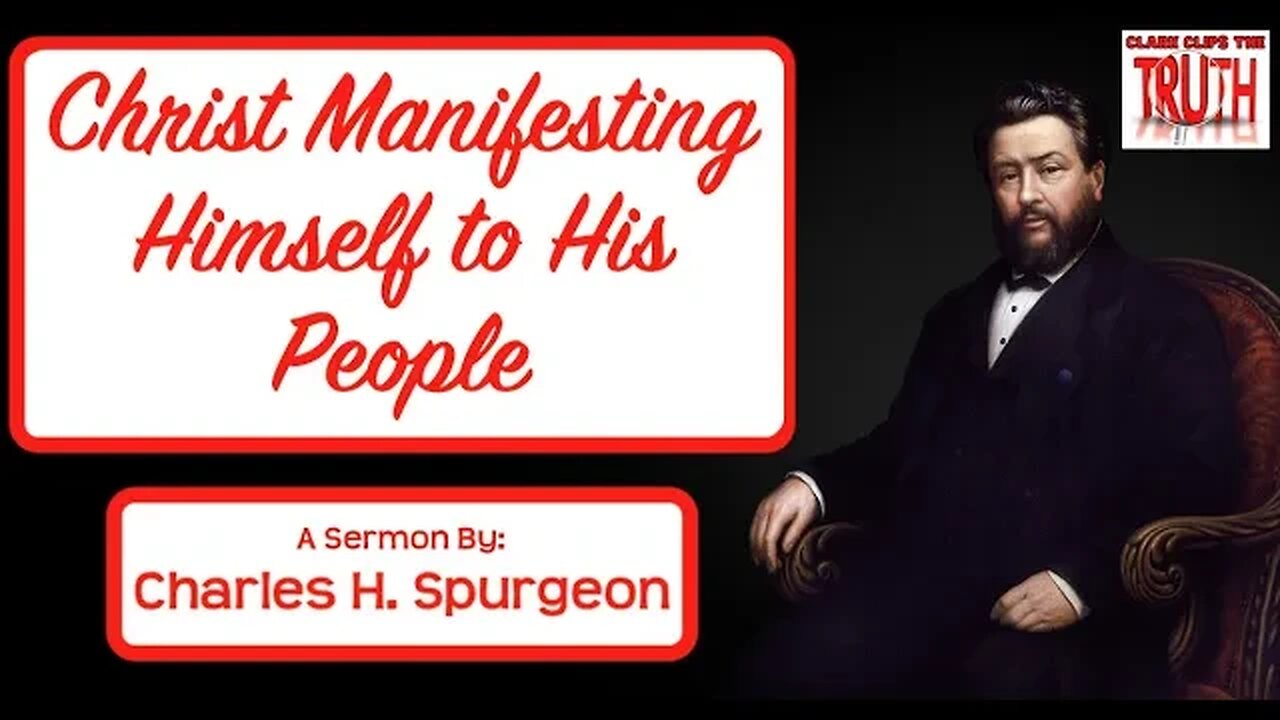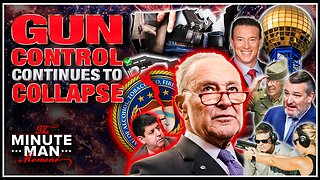Premium Only Content

Christ Manifesting Himself to His People | Charles Spurgeon Sermon
Christ Manifesting Himself to His People | C H Spurgeon Sermons | Audio Sermon
Christ Manifesting Himself to His People
Charles Haddon Spurgeon June 10, 1855
Scripture: John 14:22
From: New Park Street Pulpit Volume 1
"Judas saith unto him, not Iscariot, Lord, how is it that thou wilt manifest thyself unto us, and not unto the world?"—John 14:22
What a blessed Master Jesus Christ was! How familiar did he allow his disciples to make themselves with him! Though he was the Lord of life and glory, the great and mighty one, as well as the man of Nazareth, yet see how he talks with his poor disciples, the fishermen, just as if he had been one of the same class and order with themselves! He was none of your dignitaries who pride themselves on that dignity—none of those ecclesiastics who love to carry much of formality about them, and to walk above other men, as if they were not indeed their fellows; but he talks to his disciples just as a father would to his children—even more kindly than a master might to his pupils. He lets them put the simplest questions to him, and instead of rebuking them for their familiarity, he condescends to answer everything they please to ask him. Philip uttered a sentence which one would think no sensible man, who had been so long time with Jesus, ever could have troubled him with. He said, "Show us the Father and it sufficeth us." A stupid idea! As if Jesus Christ could shew the Father; that is to say, could shew God to Philip! And Jesus kindly answered—"Hast thou been so long time with me, and yet hast thou not known me, Philip? Believest thou not that I am in the Father, and the Father in me? He that hath seen me hath seen the Father." And now comes Judas (not Iscariot); and he puts also a very simple and easy question—one he needed not to have asked; but Jesus Christ, instead of rebuking him, simply passes on to another subject, and forbears most wisely to answer the enquiry, because he would teach him more by silence than he could do by an explanation.
We must also notice here how very particular the Holy Ghost is that a good man should not be confounded with a bad one. He says, "Judas, not Iscariot." There were two of the name of Judas; the one who betrayed our Lord, and the other who wrote the epistle of Jude, who should properly have been called Judas. Some of us, in reading the name Judas, might have said, "Ah! it was that traitor Judas Iscariot that asked the question." But the Holy Spirit would not allow this mistake to be made...
#SpurgeonSermon #Spurgeon #Puritan
********************************************************
Please Note: Whenever possible, please support the original content creator before supporting me. With that said, if you find value in the small service that I provide (i.e., searching out the Truth and directing my audience to phenomenal content and channels) and if you feel led...
Please Help Support "Clark Clips the Truth" Ministry:
Like. Share. Comment. Subscribe. Pray.
Venmo: https://www.venmo.com/u/ClarkClips
Patreon: https://www.patreon.com/clarkclips
Thank you so much and may God Bless You Abundantly!
********************************************************
Also, Please Support the Creator of This Audio Recording, "Koelsch Broadcasting Productions." Thanks and God Bless!
Source:
Prince of Preachers
Phone: (864) 404-1542
Koelsch Broadcasting Productions
5 Scottswood Rd.
Greenville, SC 29615
https://www.sermonaudio.com/solo/pop/sermons/12130114713/
CONTACT: https://www.sermonaudio.com/solo/pop/contact/
ABOUT:
We are a radio broadcast located in Koelsch Broadcasting Productions.
Charles Haddon Spurgeon (1834-92) was England's best-known preacher for most of the second half of the nineteenth century. In 1854, just four years after his conversion, Spurgeon, then only 20, became pastor of London's famed New Park Street Church (formerly pastored by the famous Baptist theologian John Gill). The congregation quickly outgrew their building, moved to Exeter Hall, then to Surrey Music Hall. In these venues Spurgeon frequently preached to audiences numbering more than 10,000—all in the days before electronic amplification. In 1861 the congregation moved permanently to the new Metropolitan Tabernacle.
-
 1:08:16
1:08:16
Tactical Advisor
4 hours agoNEW Budget Glocks | Vault Room Live Stream 011
30.1K3 -
 16:30
16:30
SNEAKO
11 hours agoNO FRIENDS IN THE INDUSTRY.
62.9K17 -
 6:19
6:19
BlackDiamondGunsandGear
23 hours agoHow Fat Guys can Appendix Carry
35.8K2 -
 6:58
6:58
Gun Owners Of America
1 day ago2024 Was Huge For Gun Rights, Here's Our Top 10 Wins!
33.9K1 -
 15:50
15:50
Degenerate Jay
1 day ago $1.49 earnedJames Bond Is Being Ruined By Amazon? Make Him A Black Gay Woman?
25.6K9 -
 15:18
15:18
DeVory Darkins
1 day ago $13.64 earnedTrump Drops NIGHTMARE Warning on Joe Biden
41.4K46 -
 36:13
36:13
The Why Files
1 month agoAlien Implants Vol. 1: Devil’s Den UFO Encounter: What Was Found Inside Terry Lovelace?
71.3K39 -
 9:03
9:03
Alabama Arsenal
1 day ago $0.48 earnedAAC HUB 2K | Modern Features, Iconic Classic Looks
12.3K1 -
 13:49
13:49
Dermatologist Dr. Dustin Portela
2 days ago $0.87 earnedDermatologist Reveals the Worst Things To Do To Your Skin
7.96K2 -
 1:02:24
1:02:24
PMG
1 day ago $0.22 earned"Hannah Faulkner and Jamie Villamor | DEFEND, INSPIRE, INFLUENCE"
8.3K